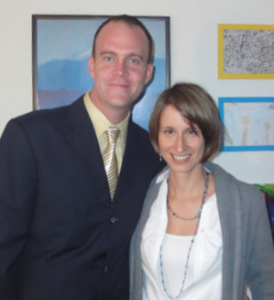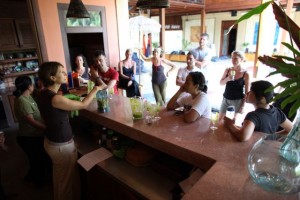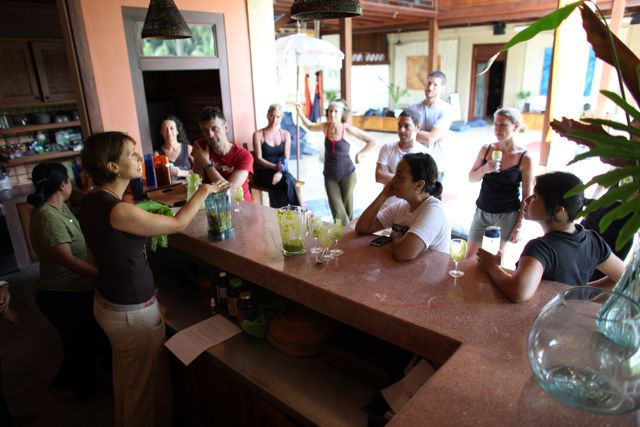I recently had the pleasure of “virtually” connecting with Renee Martyna and Steve Munroe of Satori Worldwide. They have a compelling story with which I think many aid workers can identify. They share it below.
***
When we met back in 1998, we were young in more ways than one. Although we were not missionaries in the strictest sense, we were surely full of a non-sectarian but very potent form of ‘save the world’ zeal. The injustice of the world order and the glamour of a life of working in far flung places to set it right were all too appealing for two people with a high tolerance for risk.

(Plus, our parents loved to write about our exploits in the Christmas newsletter… and who can resist external validation?)
Almost to the minute of leaving graduate school we set out on our first mission with the United Nations in Uzbekistan, and were quickly initiated into the realities of development as it then appeared. There were no quick fixes. You could work very hard and still feel like nothing was getting done. And poverty, violence and despair did not make the most inspiring work environment.
As we moved through several subsequent postings in Europe, Sri Lanka and Cambodia, and began hauling two unsuspecting children from one home to the other, our missionary zeal seemed to morph—subtly but perceptively—into something far more sinister: the mercenary mind.
We began to notice that dinner conversations revolved more and more around what country we might like to live in next (sometimes even only a few months after arriving in the current one) or what contract type and benefits we should be pushing for, rather than the plight and opportunities before the people we were meant to be serving. Our sense of social justice was ebbing under the influence of a slow and painful cynicism. Then one day, as we were watching the news and learned of a horrible disaster in another exotic locale, one spouse turned to the other and said: What do you think of moving there?
Suddenly a deep and dark realization set in. We looked into each other’s eyes but didn’t say a word, because we both knew what the other was thinking…. Had we become the aid worker equivalent of ambulance chasers?
So we took stock: When was the last time we felt truly inspired? How many projects had we built that had been spoiled by corruption or weighted by bureaucracy? Was sacrificing grandparents for our kids and forfeiting a clean, safe, familiar place for them to grow up in really worth it? How many of our colleagues seemed jaded, high strung or burnt out? Is this the life we had dreamed of? What happened to making a difference?
In fact, we might have noticed the misalignment earlier if we had been paying attention. The symptoms of disintegration were clear. After multiple infections with various tropical illnesses (dengue, typhoid, dysentery), our immune systems had practically collapsed. Progressive irritation with the ‘system’ under which we were employed gave every conversation a world-weary, sarcastic veneer. Anxiety often deprived us of sleep, and what sleep we did get was speckled with recurring nightmares of human rights abuses we had documented, or bombs and gunfire that had gone off down the street. We felt more and more alienated from our friends and family in Canada, who seemed convinced that our life must be easy because we had a maid.
And things were getting tense at home.
Steve was either traveling or recovering from being away by catching up at work or sleeping off jetlag. So I began nursing regular resentments over being a single parent to our two children, and ruminating about the days when I also got to travel and attend ‘important’ meetings (episodes which were promptly followed by a hefty dose of mother’s guilt). Then there was a growing concern over the welfare of our children, who lived under the constant threat of pollution, illness and instability.
When our son Lochlan contracted a rheumatic fever because of an undiagnosed strep infection (read: medical malpractice), it seemed time to cry uncle. It was time to go home.
And that we did. But here is the thing…home didn’t feel like that anymore. Maybe it was being disconnected from pop culture for so long (Brangelina? Who the hell is that?). Or maybe it was that we never belonged there in the first place. But a few months back in Canada confirmed that we were just too far gone to slip back into a ‘normal’ sedentary existence. Had we seen too much? Were we damaged somehow? Who were we now that we were no longer “Renee and Steve out to save the world”? Our lives overseas had changed us in ways that made it seem impossible to go back. By this point, it seemed like it might take a miracle to help us recover our sense of balance and belonging.
We were now, officially, misfits.
So once again one spouse turned to the other, this time to say: how about instead of moving back, we don’t move back? And the other agreed. But now what? Back to being Aid Workers? We desperately needed to make ourselves useful; I guess the altruistic fire still simmered somewhere deep inside us.
And then that evening, as I was reading in the bath, a quote by Henry Thurman practically jumped from the page.
“Don’t ask what the world needs; ask what makes you come alive, because what the world really needs is more people who are alive.”
And right there a little seed was planted… something that would help us rekindle those long lost feelings of adventure, inspiration and justice. We hit the road, with both kids in tow, on a quest to recover our integrity.
Through Scottish highlands, Danish castles, Vietnamese soup houses and Singaporean malls we trekked with determination to find some answers. Along the way we met mystics and naysayers of every stripe, who, one way or the other, were all pointing toward the same grail.
Get to know yourself. Breathe deeply. Listen carefully. Eat real food. Find real friends. Create. Serve. Cry if you need to. Laugh twice as much.
To which we thought: if only we had known!
And the seed began to flower.

We rounded out our map by landing in a place that had always whispered to us… Bali, a place where fresh air, fresh food and fresh perspective abound. Then we sat down to the task of sharing what we had learned with the people we thought might make the best use of it—other, world-weary aid workers like us.
In the process we discovered that we really did still care, that we really were good people, and that we really had something to offer the world.
Because that’s what recovery from burn out feels like. We came alive.
In August 2010, after a gestation that seemed a figurative lifetime, we delivered our third child into the world: Satori Worldwide, a small business that aims to bring meaning, balance and inspiration into the lives of global servants.
And so the flower began to bloom.
We called it Satori—the Japanese word for a ‘flash of enlightenment’– to reflect our seminal desire to help people achieve clarity around their life purpose, and bring more of their ‘best selves’ to the work that they do. Now Satori has evolved into a social enterprise dedicated to discovering new and creative ways to improve the lives of global servants. We aim to bring the soul back into development.
We were missionaries again! More emotionally mature this time, hawking development with a twist. We are still active aid workers today, this time with work schedules that are heavily laced with life. Turns out that the only miracle we really needed to save us was a shift in perspective. Save the world by saving yourself first.
***
Satori Worldwide offers restorative retreats for aid workers, international organizations and expatriate families. Satori’s next retreat will be held in Bali, May 15th to 24th, but programs are also offered worldwide. Contact info@satoriworldwide.com for details. See the video below to learn how Satori can help you cultivate resilience and bring the best of who you are to what you do.
***
Related Posts
Confessions of a Recovering Neocolonialist


Pingback: Tweets that mention How Matters / Missionaries, Mercenaries & Misfits: How two aid workers came full circle in the development world -- Topsy.com
Good for you! What a creative idea, and maybe you should do some writing on the side. Hope your feelings of satisfaction and accomplishment remain high and good luck with all your endeavors. It is really nice to keep in touch with your lives via Justine.
Greetings from distance South India. I may please be permitted to place this letter before with all respect. I would like to introduce myself as a P.Varaprasadarao, doing ministry for 13 years at payakaraopeta in visakha district in Andhra Pradesh in India.
We wanted to reach the un-reached villages of Sea-shore areas as well as interior areas. For that we prepared team of missionaries in un-reached areas in Andhra Pradesh. But our missionaries are facing lot of troubles from the field due to lack of Church Shelter and ministry equipments and oppositions. For that we are unable to move to another un-reached area. So we wanted work with you to reach the un-reached. But still we wanted to cross the seashore people and as well as tribal people. We are also doing gospel work along with social action. I am looking for your kind reply
Prayer points
1. Church plantation, seminars
2. Orphan home
3. Missionaries, outreach ministry
4. Tracts distribution
5. Film ministry
From Rev.Penke Varaprasadarao
Andhra Pradesh, India
http://www.ccimaindia.org
Highly inspiring and feel-same story that puts all of us aid-workers in a quandary as to what we need from life- stability v/s adventure; predictability v/s evolvement and/or peace v/s fight (with all odds) at times! I believe Life is all but a trade-off between aspirations & ground realities especially for a development professional. Well the worst is that you can’t complaint either as you only chose this one for you! But thanks Renee/Steve you showed some hope in the end, which speaks volumes for your determination to make it big!
Since 1965 I have observed the aid business from the World Bank, USAID and the UN, having lived off them after the kleptcratic and value samshing governments of Kenya, Tanzania and Zambia stole my businesses with the connivance and encouragement of the “experts” funded or employed by these “aid” organisations.
In my view western expats outside the health and education sectors are worse than useless. They are toxic.Its all about themselves, the high salaries and cost free tourism. In Iraq and Afghanistan the American contractors pocket $400,000/y and by the time the other costs are included the cost per year is $1.5 million/y. And this is bruited as money going to Irakis and Afghans.
And the racket goes on and on. As the USAID web site bragged, until 2005, 80% of USAID funds stay in the US. Now its 90%.
Pingback: I support aid workers and so should you! | whydev.org